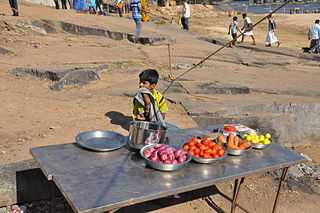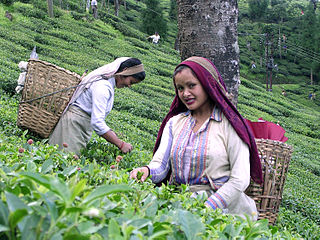Labour laws are those that mediate the relationship between workers, employing entities, trade unions, and the government. Collective labour law relates to the tripartite relationship between employee, employer, and union.

A sweatshop or sweat factory is a crowded workplace with very poor, socially unacceptable or illegal working conditions. Some illegal working conditions include poor ventilation, little to no breaks, inadequate work space, insufficient lighting, or uncomfortably/dangerously high or low temperatures. The work may be difficult, tiresome, dangerous, climatically challenging or underpaid. Workers in sweatshops may work long hours with unfair wages, regardless of laws mandating overtime pay or a minimum wage; child labor laws may also be violated. Women make up 85 to 90% of sweatshop workers and may be forced by employers to take birth control and routine pregnancy tests to avoid supporting maternity leave or providing health benefits. The Fair Labor Association's "2006 Annual Public Report" inspected factories for FLA compliance in 18 countries including Bangladesh, El Salvador, Colombia, Guatemala, Malaysia, Thailand, Tunisia, Turkey, China, India, Vietnam, Honduras, Indonesia, Brazil, Mexico, and the US. The U.S. Department of Labor's "2015 Findings on the Worst Forms of Child Labor" found that "18 countries did not meet the International Labour Organization's recommendation for an adequate number of inspectors."

Fairtrade International, or Fairtrade Labelling Organizations International e.V. is a product-oriented multistakeholder group aimed at promoting the lives of farmers and workers through trade. Fairtrade's work is guided by a global strategy focused on ensuring that all farmers earn a living income, and agricultural workers earn a living wage. Fairtrade works with farmers and workers of more than 300 commodities. The main products promoted under the Fairtrade label are coffee, cocoa, banana, flowers, tea, and sugar.
Labor rights or workers' rights are both legal rights and human rights relating to labor relations between workers and employers. These rights are codified in national and international labor and employment law. In general, these rights influence working conditions in relations of employment. One of the most prominent is the right to freedom of association, otherwise known as the right to organize. Workers organized in trade unions exercise the right to collective bargaining to improve working conditions.

The term ethical trade first gained currency in the mid-1990s, where it was used as a term for socially responsible sourcing. Ethical trade addresses the ethical aspects of organisations including worker welfare, agricultural practice, natural resource conservation, and sustainability of the environment. Since then, numerous multinational organisations have adopted ethical trade policies by outsourcing to auditing companies to monitor the conditions of workers in their supply chains. The leading alliance of these companies, trade unions and non-governmental organisations is the Ethical Trading Initiative. to support business

The International Labor Rights Forum (ILRF) is a nonprofit advocacy organization headquartered in Washington, D.C., U.S., that describes itself as "an advocate for and with the working poor around the world." ILRF, formerly the "International Labor Rights Education & Research Fund", was founded in 1986, and the organization's mission statement reads: "ILRF believes that all workers have the right to a safe working environment where they are treated with dignity and respect, and where they can organize freely to defend and promote their rights and interests. ILRF works to develop practical and effective tools to assist workers in winning enforcement of protections for their basic rights, and hold labor rights violators accountable."

The Fair Labor Association (FLA) is a non-profit collaborative effort of universities, civil society organizations, and businesses.
The Clean Clothes Campaign (CCC) is the garment industry's largest alliance of labour unions and non-governmental organizations. The civil society campaign focuses on the improvement of working conditions in the garment and sportswear industries. Formed in the Netherlands in 1989, the CCC has campaigns in 15 European countries: Austria, Belgium, Denmark, Finland, France, Germany, Italy, Ireland, Netherlands, Norway, Poland, Spain, Sweden, Switzerland and the United Kingdom. The CCC works with a partner network of more than 250 organizations around the world.
Nike, Inc. has been accused of using sweatshops and worker abuse to produce footwear and apparel in East Asia.
International labour law is the body of rules spanning public and private international law which concern the rights and duties of employees, employers, trade unions and governments in regulating Work and the workplace. The International Labour Organization and the World Trade Organization have been the main international bodies involved in reforming labour markets. The International Monetary Fund and the World Bank have indirectly driven changes in labour policy by demanding structural adjustment conditions for receiving loans or grants. Issues regarding Conflict of laws arise, determined by national courts, when people work in more than one country, and supra-national bodies, particularly in the law of the European Union, has a growing body of rules regarding labour rights.

The 2013 Rana Plaza factory collapse was a structural failure that occurred on 24 April 2013 in the Savar Upazila of Dhaka District, Bangladesh, where an eight-story commercial building called Rana Plaza collapsed. The search for the dead ended on 13 May 2013 with a death toll of 1,134. Approximately 2,500 injured people were rescued from the building. It is considered the deadliest accidental structural failure in modern human history, the deadliest garment-factory disaster in history and the deadliest industrial accident in the history of Bangladesh.
The Accord on Fire and Building Safety in Bangladesh was signed on 15 May 2013. It is a five-year independent, legally binding Global Framework Agreement between global brands, retailers and trade unions designed to build a safe and healthy Bangladeshi Ready Made Garment (RMG) Industry. The agreement was created in the immediate aftermath of the Rana Plaza building collapse that led to the death of more than 1100 people and injured more than 2000. In June 2013, an implementation plan was agreed leading to the incorporation of the Bangladesh Accord Foundation in the Netherlands in October 2013.
Clothing industry or garment industry summarizes the types of trade and industry along the production and value chain of clothing and garments, starting with the textile industry, embellishment using embroidery, via the fashion industry to apparel retailers up to trade with second-hand clothes and textile recycling. The producing sectors build upon a wealth of clothing technology some of which, like the loom, the cotton gin, and the sewing machine heralded industrialization not only of the previous textile manufacturing practices. Clothing industries are also known as allied industries, fashion industries, garment industries, or soft good industries.

Export-oriented employment refers to employment in multinational corporations' international industrial factories, usually located in developing countries. Such factories produce goods and services for sale in other countries. While these multinational producers have globally expanded women's access to employment, evidence suggests they do so by reinforcing traditional gender roles or creating new gender inequalities. Such gender inequities allow multinational firms to greater exploit profits per worker than they would otherwise due to the decreased labor cost. This decrease in the cost of labor comes as a result of the relegation of women to certain occupations. Studies show that in the quest for lower unit labor costs, export-oriented facilities create poor working conditions.
The Ethical Trading Initiative (ETI) is a UK-based independent body founded on 9 June 1998, which brings together companies, trade unions and non-governmental organisations (NGOs) to ensure compliance with international labour standards in the global supply chains of member companies. Minimum ethical standards are set out in the ETI Base Code.
The Garment Workers Unity Forum (GWUF) is a national trade union federation of garment workers in Bangladesh.
The National Garment Workers Federation (NGWF) is a registered national trade union federation of garment workers in Bangladesh. With 87 registered factory unions, it ifs considered one of the four main federations of garment workers' unions. NGWF is the initiator and a member of the Bangladesh Garments Workers Unity Council and a member of the Bangladesh Center for Workers' Solidarity. It is affiliated with the IndustriALL Global Union and one of the signatories of the Bangladesh Accord.
The Bangladesh Independent Garment Workers Union Federation (BIGUF) is a trade union federation of garment workers in Bangladesh. It is considered one of the four main federations of garment workers' unions. BIGUF is affiliated with the IndustriALL Global Union and a member organisation of the Bangladesh Center for Workers Solidarity. It is also one of the signatories of the Bangladesh Accord. Unlike many other trade unions in Bangladesh, it is explicitly not affiliated with any political party.
The Bangladesh Garments Workers Unity Council (BGWUC) is a national trade union centre in Bangladesh. The centre unites 21 garment worker trade union federations.
The Bangladesh Institute of Labour Studies (BILS) is a think tank for trade union activity and other labour matters in Bangladesh. It was founded in 1995 to support the building of trade unions and their activities and to promote trade union causes within government and society. Today, 12 Bangladeshi trade union federations are affiliated with BILS. Unlike many other labour organisations in Bangladesh, the institute is not affiliated with any political party. The institute publishes a biannual journal, Labour.








